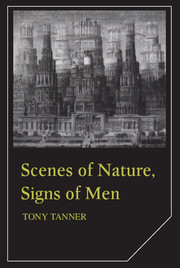Book contents
- Frontmatter
- Contents
- Preface
- 1 Scenes of nature, signs of men
- 2 Notes for a comparison between American and European Romanticism
- 3 Problems and roles of the American artist as portrayed by the American novelist
- 4 James on Hawthorne
- 5 The lost America – the despair of Henry Adams and Mark Twain
- 6 Henry James and Henry Adams
- 7 William Dean Howells and A Hazard of New Fortunes
- 8 Stephen Crane
- 9 The Bostonians and the human voice
- 10 Games American writers play: ceremony, complicity, contestation, and carnival
- 11 Toward an ultimate topography: the work of Joseph McElroy
- 12 Frames and sentences
- 13 William Gass's barns and bees
- Index
5 - The lost America – the despair of Henry Adams and Mark Twain
Published online by Cambridge University Press: 01 June 2011
- Frontmatter
- Contents
- Preface
- 1 Scenes of nature, signs of men
- 2 Notes for a comparison between American and European Romanticism
- 3 Problems and roles of the American artist as portrayed by the American novelist
- 4 James on Hawthorne
- 5 The lost America – the despair of Henry Adams and Mark Twain
- 6 Henry James and Henry Adams
- 7 William Dean Howells and A Hazard of New Fortunes
- 8 Stephen Crane
- 9 The Bostonians and the human voice
- 10 Games American writers play: ceremony, complicity, contestation, and carnival
- 11 Toward an ultimate topography: the work of Joseph McElroy
- 12 Frames and sentences
- 13 William Gass's barns and bees
- Index
Summary
Henry Adams and Samuel Clemens are often considered to represent the polar extremes of their age. Yet, however divergent their careers seem to be, it is absorbing to watch them approaching, each in his different way, a final mood of total despair that argues concurrence rather than coincidence. Personal tragedies might be adduced to explain this: the heart-breaking death of Susy Clemens and the long-drawn-out agony of Livy, the suicide of Adams's wife Clover, even the humiliation of bankruptcy, which Clemens suffered personally and Adams witnessed in his family – these certainly are contributory causes. But as one examines the conspicuous modes of this despair – a compound of comminatory denunciation and brooding, intense pessimism – one is compelled to search further afield for the prime causes. Such an investigation reveals that this despair is in a slow process of incubation from their earliest work, and that it is finally hatched by the growing discords, conflicts, and problems of the age. It is not a despair of personal bereavement but of country – ultimately of man.
Much of Adams's despair, to say nothing of his wounded pride, is the negative residue of a constantly diminishing faith in American politics, which seemed progressively to abandon all the moral idealism that he felt that he and his family preeminently represented.
- Type
- Chapter
- Information
- Scenes of Nature, Signs of MenEssays on 19th and 20th Century American Literature, pp. 79 - 93Publisher: Cambridge University PressPrint publication year: 1987



